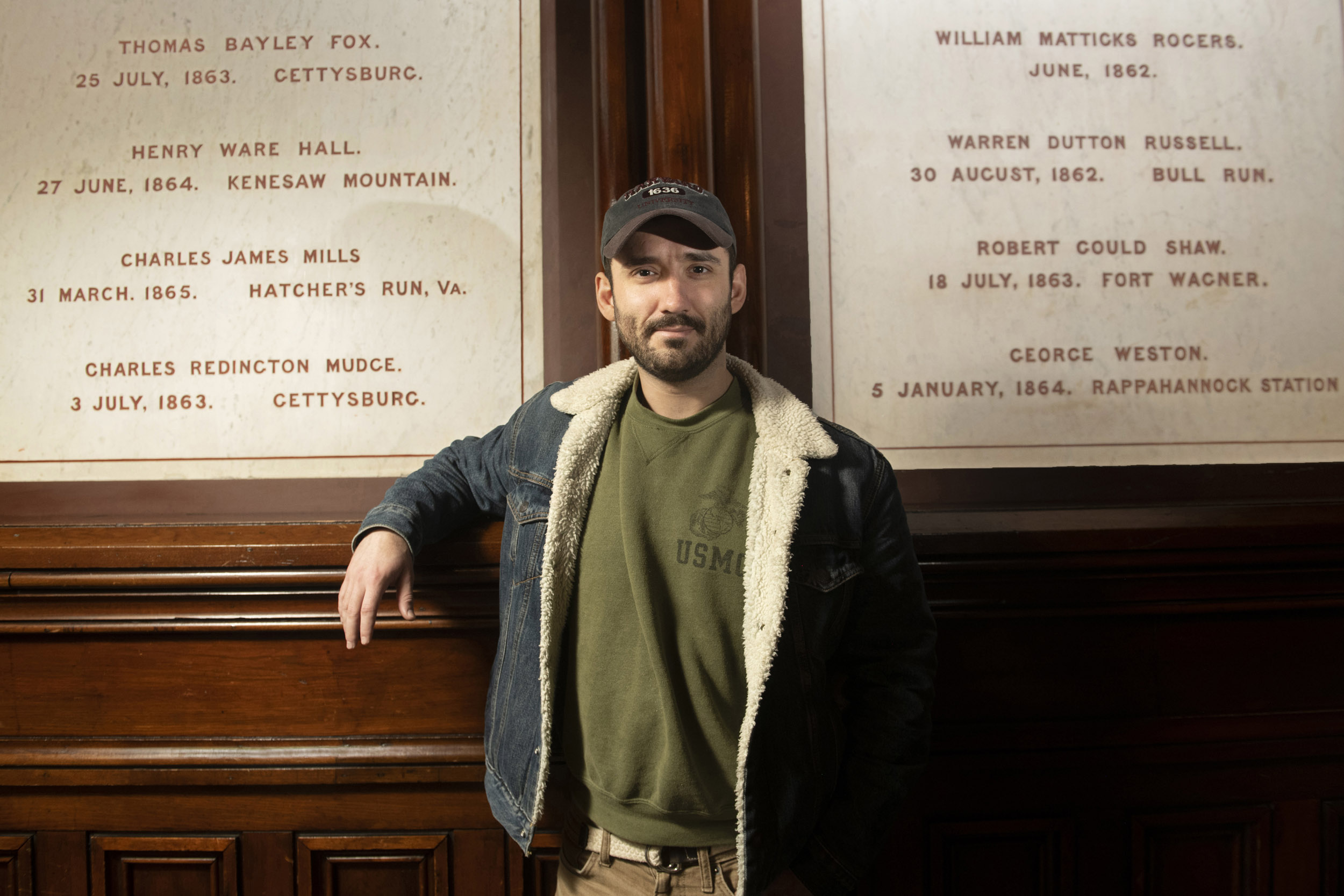
David Miller said he’s treasured the opportunity to engage with faculty, like Government Department senior lecturer Nara Dillon, and Professors Daniel Ziblatt and Steven Levitsky, authors of “How Democracies Die.”
Jon Chase/Harvard Staff Photographer
From halls of Montezuma to those of Knafel
Former Marine David Miller surprised himself by his college success and was, in turn, surprised by his experience at College
This story is part of a series of graduate profiles ahead of Commencement ceremonies.
David P. Miller grew up in Hazelwood, Missouri, close to the St. Louis airport, where he lived with his sister and parents. Dad fixed photocopiers; Mom worked as a secretary. A bunch of cousins lived close by.
“I’d say probably the most unique thing about growing up [there] was how not unique it was relative to most people at Harvard,” said Miller.
But the graduating senior’s path to Harvard was anything but ordinary.
After high school, Miller joined the U.S. Marine Corps in 2013, taking a gap year before basic training to lose 50 pounds in order to meet the military’s rigorous physical fitness requirements. His grandfather and an older cousin, whom Miller looked up to like an older brother, influenced his decision to enlist.
A flying enthusiast, he trained in aviation, learning to be a flight mechanic and becoming certified as a crew chief. That meant fixing planes even in mid-flight, managing any crew and cargo on board, assisting with navigation, and if the plane comes under attack, returning fire.
Miller left the Marines at the rank of sergeant after five years of service to study political science at St. Louis University. He chose the private Jesuit institution primarily because it was familiar and close to home and likely to accept him. His expectations for college were not high. “I was not a good student in high school,” he said.
He proved a far better college student and soon found the university was not as challenging as he’d hoped. So he explored transferring for his sophomore year, ideally to a school with a top-notch government department.
Just as the responses from admissions offices began rolling in, the pandemic hit. Already bewildered and stressed-out, when the email from Harvard College landed in his inbox, Miller was not optimistic.
“I’d already been turned down by Tufts,” he recalled.
Only 13 other transfer students besides Miller were admitted to the Class of 2023 that spring, according to the College Admissions Office.
Miller confesses that finding his niche and adapting to college life was challenging. He was a veteran, a late millennial five to six years older than his Gen Z classmates, with several years of “adulting” already under his belt. “The cultural difference was massive,” he said.
This felt particularly true to Miller who enjoyed the military’s esprit de corps, the firm structure and mission, and strong feeling of community.
“People don’t think of the Marine Corps as being very culturally rich, but there’s a very, very, very strong culture there, and if you’re the right person for that culture, it’s very nice to be [part of] that camaraderie,” said Miller, a member of the Sigma Alpha Epsilon fraternity.
Miller said he’s treasured the opportunity to engage with faculty, like Government Department senior lecturer Nara Dillon, and Professors Daniel Ziblatt and Steven Levitsky, authors of “How Democracies Die.”
“Reading a book that was profoundly influential to the way you think about the world and then going in and being able to say ‘I’m going to take this class’ is wild,” said Miller, who would eventually like to serve in city government and perhaps run for elected office one day.
A deep interest in politics and the study of democracy prompted him to do his senior thesis on how political polarization shapes the way Americans view universities. It’s an area in which he feels he can share some useful, real-world insights.
“I do know a lot of conservatives, and I talk with them, and I can relate to, or at least understand, their grievances” and can explain why they feel the way they do to others, he said. It’s an important topic “where I can probably contribute in a way that most people” at elite academic institutions “aren’t going to be able to.”
Before coming to Harvard Miller was concerned he might feel alienated at the College, assuming that most classmates were from economically privileged backgrounds and had gone to well-known private high schools on the East or West coasts. But he soon realized that wasn’t the case. Nearly a quarter of students admitted to the Class of 2027 come from a family whose annual income is $85,000 or less and nearly 15 percent of students admitted to the Class of 2026 are from outside the U.S.
Miller’s advice to fellow veterans and other students from modest backgrounds worried about feeling out of place at Harvard: “Nobody’s gonna judge you for the fact that your parents aren’t a doctor or a lawyer,” he said. “You can find your people.”




